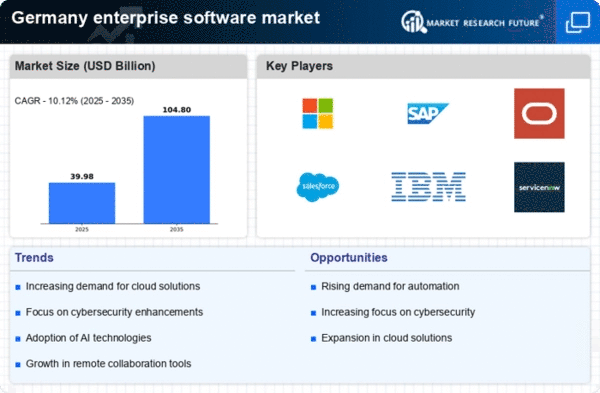Remote Work Enablement
The shift towards remote work has significantly influenced the enterprise software market in Germany. Companies are seeking software solutions that facilitate collaboration and communication among distributed teams. In 2025, it is anticipated that the demand for collaboration tools will increase by 25%, reflecting the ongoing trend of flexible work arrangements. This shift is prompting software providers to enhance their offerings, ensuring that they meet the evolving needs of businesses. As organizations prioritize employee productivity and engagement, the enterprise software market is likely to expand, driven by the necessity for effective remote work solutions that support seamless interactions and project management.
Focus on Data Analytics
The market is increasingly driven by the growing focus on data analytics. Organizations are recognizing the value of data-driven decision-making and are investing in software solutions that provide advanced analytics capabilities. In 2025, the analytics software segment is expected to represent approximately 18% of the overall market. This trend is particularly pronounced in sectors such as retail and healthcare, where insights derived from data can lead to improved operational efficiency and customer satisfaction. As businesses strive to harness the power of data, the enterprise software market is likely to evolve, offering innovative solutions that enable organizations to gain actionable insights and enhance their strategic initiatives.
Increased Cybersecurity Concerns
As cyber threats continue to evolve, There is heightened demand for robust cybersecurity solutions. Organizations are increasingly recognizing the importance of safeguarding sensitive data and ensuring compliance with stringent regulations. In 2025, the cybersecurity software segment is projected to account for over 20% of the total enterprise software market revenue. This growing emphasis on security is prompting businesses to invest in comprehensive software solutions that offer advanced threat detection and response capabilities. Consequently, the enterprise software market is adapting to these needs by providing integrated security features, thereby enhancing the overall resilience of organizations against cyber threats.
Digital Transformation Initiatives
The market is experiencing a surge due to ongoing digital transformation initiatives across various sectors. Organizations are increasingly investing in software solutions to enhance operational efficiency and improve customer engagement. In 2025, it is estimated that the market will grow by approximately 15%, driven by the need for businesses to adapt to rapidly changing technological landscapes. Companies are prioritizing the integration of advanced software systems to streamline processes and foster innovation. This trend is particularly evident in industries such as manufacturing and finance, where the adoption of enterprise software is seen as crucial for maintaining competitive advantage. As a result, the enterprise software market is likely to witness a robust expansion fueled by these digital transformation efforts.
Sustainability and Green IT Initiatives
The enterprise software market in Germany is increasingly influenced by sustainability and green IT initiatives. Organizations are under pressure to adopt environmentally friendly practices, leading to a growing demand for software solutions that support sustainability goals. In 2025, it is projected that the market for green IT software will grow by 30%, as companies seek to reduce their carbon footprint and enhance resource efficiency. This trend is prompting software providers to develop solutions that facilitate energy management, waste reduction, and sustainable supply chain practices. As a result, the enterprise software market is likely to see a shift towards offerings that align with corporate social responsibility objectives, reflecting a broader commitment to sustainability.
















